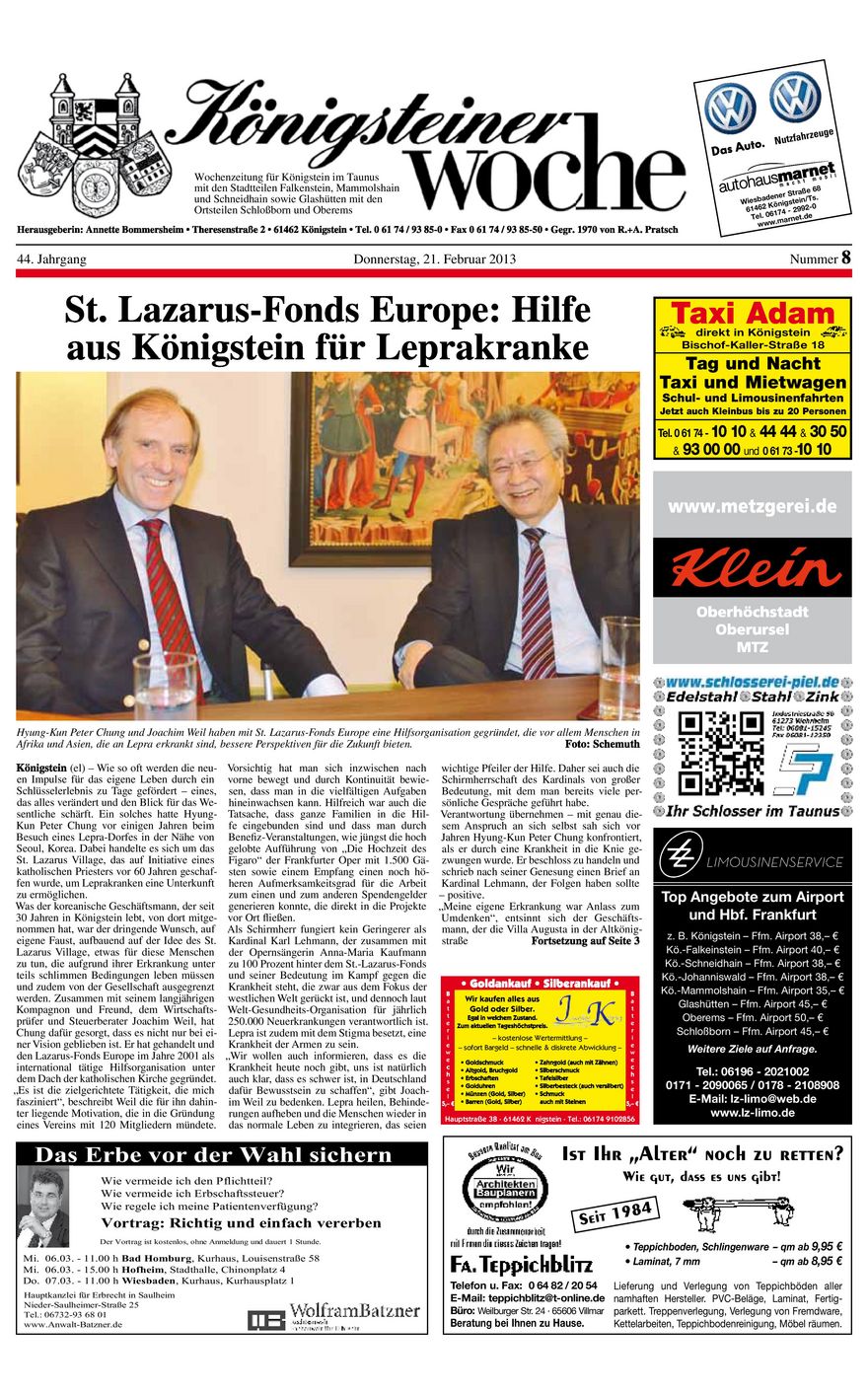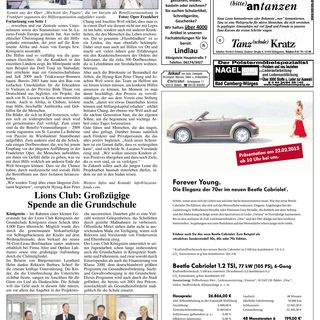Königsteiner Woche, 21.02.2013
Königsteiner Woche, Calendar Week 8
Thursday, February 21, 2013
Königstein (el) – As is so often the case, new impulses in our lives can be brought about by a key formative event – one which changes everything and sharpens the perception of what is really important. Hyung-Kun Peter Chung had such an experience some years ago during a visit to a leper colony near Seoul, Korea. The visit was to the St. Lazarus Village, which was established 60 years ago on the initiative of a Catholic priest, to make it possible to give lepers shelter.
What the Korean businessman, who has lived for 30 years in Königstein, took from this visit was an intense wish to do something for these people who, due to their illness, are cast off by society and must, at times, live in terrible conditions. This intention to do something was modelled on the St. Lazarus Village. Together with his associate and friend of many years, the accountant and tax advisor Joachim Weil, Chung ensured that this did not just remain a vision. He acted, and the Lazarus-Fonds Europe was founded in 2001 as an internationally active charity under the umbrella of the Catholic Church.
„It is the focussed activity which fascinates me“, described Weil his motivation, which led to the founding of an association with 120 members. Cautiously they moved forward and showed through continuity that they were capable of growing into the diverse roles. It was also helpful that whole families were taking part. Through charity events such as the recent highly praised performance of “The Marriage of Figaro” at the Frankfurt Opera with 1500 guests as well as a reception it was possible to obtain a greater degree of publicity for the work and also to find other sponsors to provide donations, which flowed directly into the on-site projects.
None other than Cardinal Karl Lehmann was found as a patron, and together with opera singer Anna-Maria Kaufmann he stands completely behind the Lazarus-Fonds and its value in the fight against illness. The disease has moved out of the focus of attention in the western world, but according to the World Health Organisation there are about 250,000 new cases annually. Additionally, leprosy goes together with the stigma that it is an illness of the poor.
“We want to let people know that this disease still exists. We know that it is difficult to create an awareness of this in Germany”, Joachim Weil points out. Curing leprosy, removing obstacles, and integrating people back into normal life are important pillars of assistance. This makes the patronage of Cardinal Karl Lehmann very important, and there have already been many personal discussions with him.
Taking on responsibility – Hyung-Kun Peter Chung saw himself confronted with just this demand on himself years ago when an illness had him on his knees. He decided to act, and after his convalescence wrote a letter to Cardinal Lehmann which would have results – positive results. “My own illness was a reason to re-consider” the businessman remembers. He purchased the Villa Augusta in the Altkönigstraße in Königstein and made it the centre of his business as well as the headquarters of the Lazarus-Fonds Europe. Out of deeply felt ethical conviction a concept to help has developed, which now shines from Europe, or from Königstein, onto the continents of Africa and Asia.
The assistance takes as many forms as the cruel faces which the illness shows in individual countries. For example, a focus is the village of Tonji in South Sudan. A community house was built here, and in 2009 drinking water wells were added. Back in 2003 the construction of simple accommodations for the ill in Vietnam in the province of Binh Thuan was accompanied from Germany, a project which St. Lazarus in Korea also supported. In Africa as well, in Chibote, there was help, where antibiotics and walking aids were provided.
The images which get fixed in our heads seem to contradict one another, but they pursue a common goal. On the one hand there are the charity events – in 2009 the “La Bohéme” from Puccini was presented in the Wiesbaden State Theatre. On the other hand there are the fates of some village residents, who, as seen in the reception prior to the most recent performance in the Frankfurt Opera, get people worked up, to give them the feeling that with their help they really can have an effect at the other end of the world. That they can have the opportunity to help provide medical and social help to take those affected out of their isolation.
„We will be assisting Tonji over a longer period of time“, promises Hyung-Kun Peter Chung, and Joachim Weil explains that in villages such as this there is not just leprosy but also other diseases which make life difficult for the villagers. The so-called “river blindness” is one of these afflictions, and it is also being fought. In doing so they rely on local assistance, and for many years they have had positive experiences with the nurses of the Order of Salesians. The nurses care for the roughly 300 inhabitants, who live in mud huts with straw roofs.
Bureaucracy is also part of the work which Hyung-Kun Peter Chung and Joachim Weil as well as their team of helpers must deal with, in order to implement concrete assistance. Presently they are busy completing the process to change the association into a foundation. This is so “that we can build something which lasts and receive foundation capital”, explains initiator Chung. Like Weil, Chung is building on the next generation, that of their own sons, in order that the important work which they have started continues. Good ideas and people who can support them are in demand. Additionally they need supporters and private persons who will accompany this with positive input. Both St. Lazarus managing directors are in agreement that “our patron is also a guarantee that it will continue” and “we want to pass on something positive to our children and these should be goals which are worth pursuing.” In the future the young people will also be travelling to the Sudan, so that they can experience project work up close.

